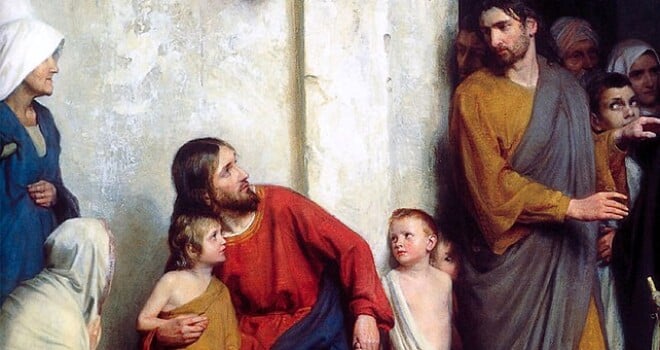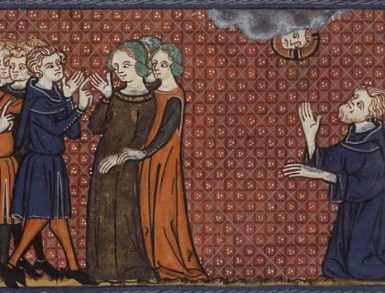Jesus admonishes the Pharisees for their hardness of heart. In other gospel passages, He refers to them as “whited sepulchers, full of dead men’s bones and all sorts of filth and contagion.” He calls them a “brood of vipers,” and He repeatedly addresses them as “hypocrites.”
Even though Jesus loves them, He endures the Pharisees with exasperation and righteous anger because they practiced the letter of the law but had no regard for its spirit. They played scriptural word games with Jesus to try to test Him and trip Him up. They were quick to tell other people how to practice their faith in God according to the Mosaic Law but didn’t practice what they preached. They tied up heavy burdens on the backs of others but never lifted a finger to help them carry those burdens. Therefore, Jesus instructed the people to do what the Pharisees told them to do but not to follow their example.
In contrast, Jesus loves children unconditionally. He promised that the kingdom of God belongs to such as these because those who accept the kingdom of God like a little child will spend eternity there. Whoever is like a little child is greatest in the kingdom of heaven. To be child-like is to be trusting, humble, simple, innocent; teachable and inquisitive; soft-hearted, vulnerable, and dependent on their parents for guidance and sustenance.
Children are a heritage from the Lord and a reward to parents, according to Psalm 127. They display the characteristics and qualities that Jesus wishes us to employ in our relationship with God. He says, “Unless you become like little children you cannot inherit the kingdom of heaven,” and “Whoever welcomes a child welcomes Me, and whoever welcomes me welcomes Him Who sent Me.”
Jesus treated children with kindness and love. In the gospels, we see the Sacred Heart of Jesus inclined toward the care, respect, and love for children. His willingness to spend time with them, value them, and protect their innocence demonstrates His high regard for them.
Because of the consequences of Original Sin, it’s easy to fall into the periodic temptations of hard-heartedness and hypocrisy displayed by the Pharisees. But, confessing those sins, we return to God and seek to re-develop that child-like trust in Him.
The Good Lord doesn’t want any of us to have a millstone tied about our necks and be cast into the sea if we cause little ones who believe in Him to sin. But He warns us that that would be a better option for the offender than the punishment that awaits those leading children astray.
We are to be that reflection of Christ in the presence of the children in our lives. Even though we make mistakes and commit errors, we need to work at becoming more and more that Image and Likeness of God in the lives of our children.
Be firm and fair. Avoid harsh words that sting and wound. Gently offer redirection and guidance with a loving heart. Avoid excessive criticism and vindictive behaviors in thought, word, and deed. As Charles Dickens said in A Christmas Carol, “to think of people as if they really were fellow passengers to the grave and not another race of creatures bound on other journeys.” It’s Dickens’s own version of The Golden Rule: we’re all in the same boat in this brief life here on earth.
St. Paul reminds us:
Never let evil talk pass your lips. Say only the good things men need to hear. Things that will really help them. Do not sadden the Holy Spirit with Whom you were sealed against the Day of Redemption.
We can certainly use our words to provide correction for our young people when necessary out of respect and love. Build them up, not break them down, demean their confidence, or damage their faith in God in any way.
Our objective should be to have them experience nothing other than what Pope Benedict XVI said of us all, and especially children: “You are needed. You are loved. And you are necessary.” In short, to do our best to be child-like in the practice of our faith by treating God’s beloved children just as Christ treated them.
Bloch, C. (1800s). Suffer the Children [painting]. Retrieved from Wikimedia Commons.










